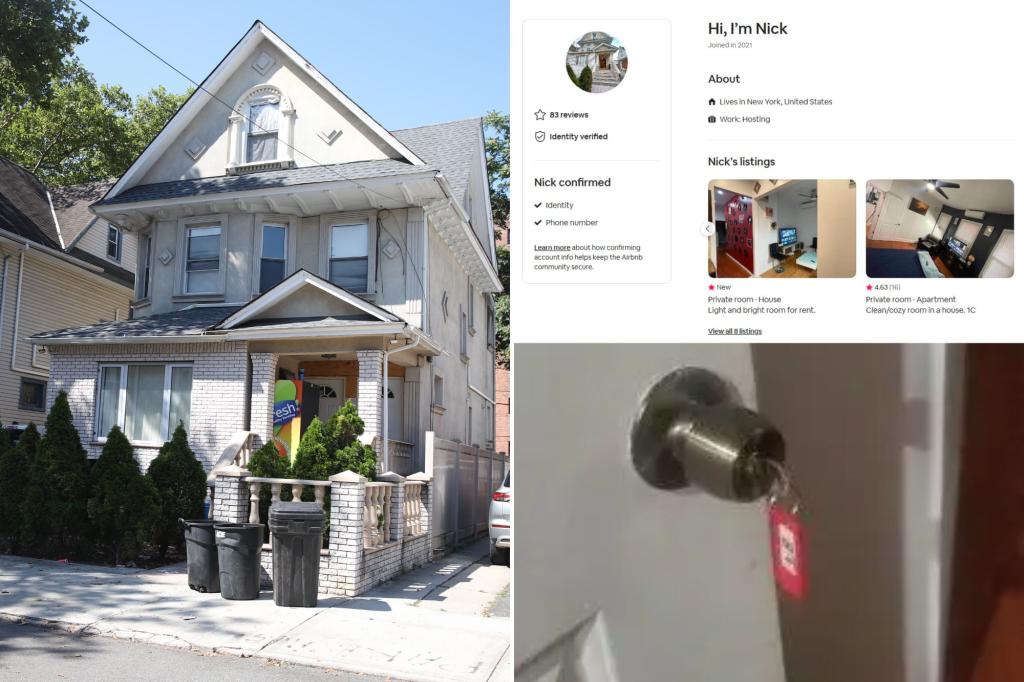
A Queens homeowner illegally turned his house into an Airbnb-style hotel with numbered units and even a soda machine – but refused to pay $420,000 in fines when he was caught, a new lawsuit claims.
Gurcharan Kaur has yet to fork over the cash from seven separate $60,000 fines issued in fall 2022, when he was accused of converting his Kew Gardens home into a getaway with daily bookings, the suit alleges.
Kaur was found in violation by an administrative court, but yet to pay a dime of the nearly half-a-million dollars in fines — and the time to challenge the violations has passed, the city said.
Kaur’s son denied the violations at a 2023 administrative hearing, but “offered no rebuttal evidence or testimony to the violating conditions established by the DOB,” the suit claims.
“We will always use every tool in our toolbox to address illegal and dangerous short-term rentals, including using the levers of the law to ensure that fines imposed are collected and paid — instead of ignored,” said a spokesperson from the Mayor’s Office of Special Enforcement.
A man at the residence who said he is Kuar’s son blamed the buildings department for blocking their efforts to rent the building.
“I’ve been trying to get an inspection done since last year — October — and there’s been no response,” the man told a reporter last week.
The supposed son, who says he works as a contractor, did not comment on the illegal rental allegations, but claimed the city would ultimately “write off the fines they have.”
City officials said they could not find a record of the homeowner asking for a re-inspection to clear the vacate order in the three years it has been in place.
In early 2022, the city passed Local Law 18, which largely banned short-term rentals offered by sites like Airbnb, where Kaur posted the rooms under the name Nick, according to images of the listing provided by city officials.
The home – which is a single-family home according to city tax records – was maintaining seven furnished rooms with key locks and door numbers, according to DOB documents.
A city inspector went to check out the home on 121st Street in October 2022 after a neighbor voiced concerns that Kaur was “renting their house as a [sic] airbnb/hotel for more than a month,” adding “different people are staying everyday” at the two-story house, according to the initial complaint.
The inspector found empty bedrooms with neatly folded sheets, “No Smoking” signs, labeled room keys — and a stocked vending machine — according to an administrative court hearing in 2023 and documents shared with The Post.
As the inspector went room to room, he found four of the rooms had so-called “renters” inside, the documents showed.
One of the illegal tenants was allegedly a minor, and had the inspector talk to his mother on the phone, who confirmed that the rental was through Airbnb.
Occupants of two separate rooms in the attic also said they were renting through AirBnB, according to the documents.
Another allegedly said they had been staying at the 121st Street house for “one month to take care of his ailing grandmother.”
The owner testified that the home — purchased two years earlier — was used as a “guest house” and only family stayed there.
The inspector noted that none of the tenants appeared to be related — with one explicitly denying any familial connection.
Kaur added that the soda machine was “just for show,” according to the hearing notes.
But the court officer was not convinced, writing that he “did not provide a valid defense to the charge.”
The department issued a full vacate order during the inspection — plus the $420,000 in fines — which is still in place to this day, officials said.
A neighbor who lived next door to the house said that while the neighbors were not noisy, they were “annoying” and would often block her driveway.
While she claimed to a reporter that she had recently seen people inside the house — despite the active vacate order — a buildings department inspector who visited the home on Friday could not confirm if the building was illegally re-occupied.
Earlier this year, the buildings department approved a permit for Kaur to legally convert the house to a two-family residence — which would also correct the violations, the permit claims.
A city official said that since the home is fewer than three units, the nearly half-a-million dollars in fines did not need to be paid prior to the permit’s approval, but stressed that the fines will still have to be paid — even if the building is brought into compliance.
<




